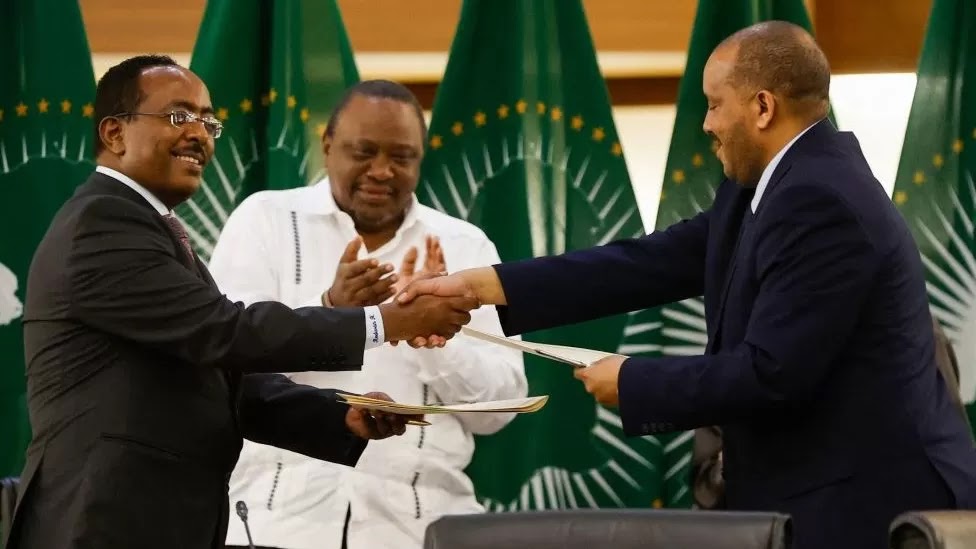 |
Redwan Hussien Rameto (L),
Representative of the Ethiopian government, and Getachew Reda (R),
Representative of the Tigray People's Liberation Front (TPLF), exchange
documents after signing a peace agreement between the two parties, Nov 2, 2022.
The
parties in the conflict in Ethiopia's northern region of Tigray have agreed to
cease hostilities, a dramatic diplomatic breakthrough two years into a war that
has killed thousands, displaced millions and left hundreds of thousands facing
famine.
The
war, which broke out in November 2020, pits regional forces from Tigray against
Ethiopia's federal army and its allies, who include forces from other regions
and from neighbouring Eritrea.
The
deal would allow for the restoration of humanitarian aid to Tigray, according
to African Union mediator Olusegun Obasanjo, who welcomed representatives from
the government and the Tigray forces to a signing ceremony on Wednesday in the
South African capital Pretoria.
On
October 25, the formal peace negotiations in Pretoria started.
![African Union Horn of Africa envoy and former Nigerian president Olusegun Obasanjo speaks during a press conference in Pretoria, South Africa [Phill Magakoe/AFP] African Union Horn of Africa envoy and former Nigerian president Olusegun Obasanjo speaks during a press conference in Pretoria, South Africa [Phill Magakoe/AFP]](https://blogger.googleusercontent.com/img/b/R29vZ2xl/AVvXsEgdX8mPM72BMQA8_8NPrgsOoj5n5lOUlHcfvIZ0Aj2duB_Ma5kjGaGWZJrihgibaXTqYAWxRLVjeS6b4BpziuuB6XGljpvvGe50wZDcPykVhv-DyoEcu6NaLAc3rYl9dn6D6J_o3-ROSTvOBViOeserswdL_YopUu75IoZVWT1LyvMd5Awo6lLt3HOJ/s16000/000_32MN48G.webp) |
| African Union Horn of Africa envoy and former Nigerian president Olusegun Obasanjo speaks during a press conference in Pretoria, South Africa [Phill Magakoe/AFP] |
Former
Nigerian president Obasanjo, who has been in charge of the African Union's
mediation team, declared that a high-level African Union panel will oversee and
monitor the agreement's implementation. He applauded the procedure for being an
African response to an African issue.
According
to Reuters, Ethiopian government representative Redwan Hussien, who is Prime
Minister Abiy Ahmed's National Security Adviser, said all parties should be
true to the letter and spirit of the agreement.
In
response, Tigray delegate Getachew Reda, a spokesman for the regional
authorities, spoke of the wide scale death and destruction in the region and
said it was his hope and expectation that both parties would honour their
commitments.
“It
is now for all of us to honor this agreement,” said the lead negotiator for
Ethiopia’s government, Redwan Hussein.
Tigray’s
fighters hailed the deal and said they had made “concessions.”
“We
are ready to implement and expedite this agreement,” said the head of their
delegation, Getachew Reda.
“In
order to address the pains of our people, we have made concessions because we
have to build trust.”
“Ultimately,
the fact that we have reached a point where we have now signed an agreement
speaks volumes about the readiness on the part of the two sides to lay the past
behind them to chart a new path of peace,” said Reda.
The
conflict has at times spilled out of Tigray into the neighbouring regions of
Amhara and Afar.
Renewedconflict in this unseen war — hidden behind a government siege which has
severed communications in the region and mainly unreported because journalists
are largely locked out — has left 5.2m people urgently needing emergency aid
across a territory the size of Switzerland.
Artillery
barrages, drone strikes, and pitched battles have pulled in neighbouringcountries and have reportedly involved hundreds of thousands of combatants. In
recent weeks, according to UN observers, hundreds of civilians have died and as
many as 500,000 people have fled their homes.
The
stakes for the civilians of the region are very high and while the African
Union is desperately trying to organised peace talks — negotiations were
supposed to take place last week only to be cancelled — as each of the warring
parties has been accused of war crimes; of using starvation as a weapon of war,
and sexual slavery to subjugate women.
This
is a conflict which has worsened with every day that passes and the
international community now needs to work together to stop this conflict with a
humanitarian nightmare facing this part of the horn of Africa.
Read more detail here
With
Reuters and Aljazeera









0 Comments